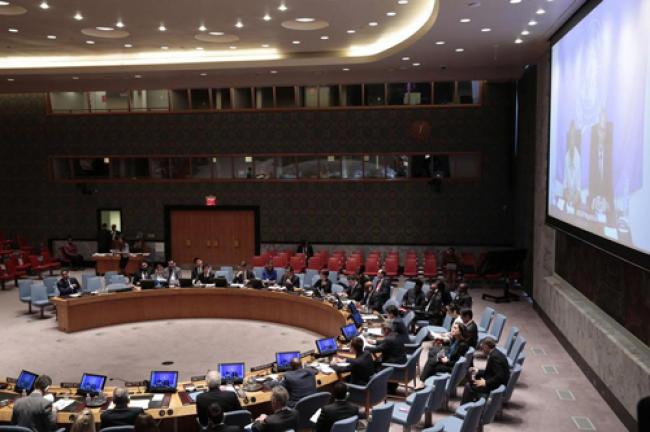Conflict
Crisis/Conflict/Terrorism Somalia nearing danger zone in critical areas: UN
23 May 2014, 07:48 am Print

New York, May 23 (JEN): While Somalia has made political, economic and security progress in the last 12 months, the country is approaching a “danger zone” in a number of areas, the top United Nations official warned on Thursday.
“2014 is critical for Somalia. Time is short. I remain a firm optimist, but it is clear that the Government and its international partners must make faster progress,” Nicholas Kay, the Secretary-General’s Special Representative and head of the UN Assistance Mission in Somalia (UNSOM), said in a briefing to the Security Council.
Speaking via video teleconference from the capital, Mogadishu, Kay noted that politically, the Federal Government has started to address some of the major outstanding disputes between the centre and the regions, and that the country has continued to show signs of economic growth.
There have also been recent improvements in security in Mogadishu, said Kay, adding that a new Government strategy and closer joint work with the African Union Mission in Somalia (AMISOM) is beginning to show positive results on the ground.
“Recognizing political, economic and security progress should not – and does not – blind us to the significant shortcomings and challenges that remain,” he went on to say.
He noted that while the new Government of Prime Minister Abdiweli Sheikh Ahmed has injected fresh momentum, progress on state-building has not been as fast as needed. When he last briefed the Council in March, the Federal Government was close to finalizing a detailed blueprint for building a Federal Somalia, revising and implementing the constitution, and preparing for elections in 2016.
“Unfortunately, this critical plan, with timelines and benchmarks, remains pending,” he stated.
“I fear that Somalia is approaching a danger zone in a number of areas. Politically, there needs to be urgent progress in establishing the mechanisms to revise and implement the constitution, oversee the establishment of federal states and prepare for elections.”
He also voiced concern that the current political crisis in Mogadishu, which includes a call by over 100 Members of Parliament for the President to resign, could herald a return to the cycle of deadlock and infighting between Somalia’s political institutions that has paralyzed governments since 2000. Somalia needs continuity and stability in its political leadership, he stressed.
“The expectations of the Somali people are high and patience is a virtue in short supply,” the envoy remarked, adding that Somalia cannot afford further delays in its state-building process. “Its institutions should work together within the distinct roles and responsibilities set out for them in the Constitution to deliver what the people need and expect.”
There is also a need for urgent progress on security and stabilization in newly recovered areas, Kay noted. Locally acceptable administrations need to be established and local people must see peace dividends soon. Access to these areas, currently obstructed by ongoing Al-Shabaab activity, also needs to be secured urgently.
Also important is building a sustainable, professional and truly national Somali army, he said, noting that to date, despite considerable efforts by international partners, progress is still fragmentary and insufficient.
The Special Representative also highlighted the critical humanitarian situation in the Horn of Africa nation, which risks slipping into the danger zone as well.
“There is a real danger of a worsening of the existing crisis as a result of ongoing conflict, poor rains and lack of sustained access to towns due to Al-Shabaab tactics of blocking main supply routes,” he stated.
“While we do not know which way the food security situation will go, this is no time for ‘business as usual’ in Somalia. If Somalia’s humanitarian situation is allowed to slip back into emergency, it will jeopardize the political, economic and development gains that have been achieved.”
Also on Thursday, the Council adopted a presidential statement that follows up on a letter of the Secretary-General offeringrecommendations for assisting the Federal Government with complying with its arms and ammunition management obligations.
“The Security Council underlines that improved arms and ammunition management in Somalia is a fundamental component of greater peace and stability for both Somalia and the region,” said the 15-member body, adding that it remains concerned about the diversion of arms and ammunition, including potentially to Al-Shabaab.
Among other steps, the Council called on Member States to offer necessary financing and technical assistance and suggested the creation of a verification mechanism including international experts.
Security Council meets on situation in Somalia. UN Photo/Evan Schneider
More Conflict
- Pakistan: Gunmen abduct, kill nine passengers in Balochistan
- Islamabad designates Iran-backed Shiite militant group Zainebiyoun Brigade as terror organisation
- Quetta blast leaves one dead
- Exchange of fire with security forces leaves two terrorists killed in Pakistan
- Karachi imposes ban on use of drone cameras following suicide attack which left five Chinese nationals killed






